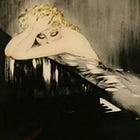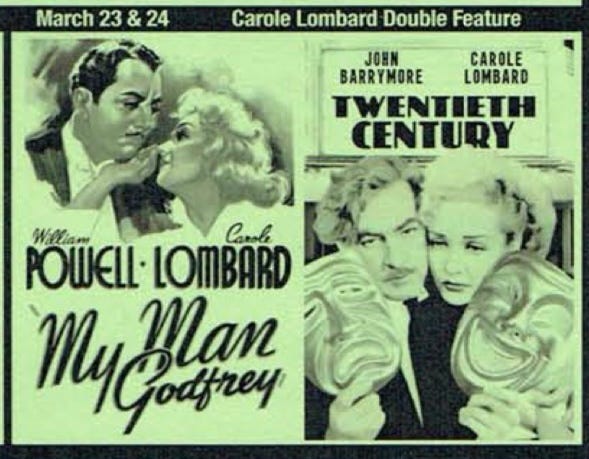‘From the Grave of Someone You Loved Yesterday’
And other poetic musings from a Carole Lombard double feature at the New Bev
***Please take out a membership to join our community events, access all archives and support independent investigative journalism.***
From the Grave of Someone You Loved Yesterday
Oscar Jaffe: “From the grave of someone you loved yesterday, how’s that?”
Owen O’Malley: “A little on the sad side, isn’t it?”
Oscar Jaffe: “It’s perfect. I wish I could get playwrights to write like that.”
—John Barrymore as Broadway impresario Oscar Jeffe, sending gardenias to Carole Lombard as Lily Garland in Twentieth Century, 1934
I was so tense driving to the New Bev on Sunday night to meet friends from the Bette/Lucid community to make it in time for a Carole Lombard double feature.
My head was still in the Mike Johnson investigation that was set to run the following day.
Even after I send off my reports, my mind is still investigating — digging, digging, finding more evidence — and as I gripped the wheel, I was kicking myself for not noticing Johnson’s shoes were two sizes too big for him until the third viewing of the Ark Encounter video. Well, I just had to let it go. I turned on Oisin Lunny’s latest ‘mixtape’ and surrendered to life’s imperfections.
And that’s when I noticed the clouds. It had hailed earlier in the day, but the sky was now healing from a magnificent stormy weather burst, and pale yellow beams of sunlight were streaming onto the Hollywood freeway through periwinkle fluff balls.
I reminded myself that I was on my way to see friends in my favorite church — Quentin Tarantino’s New Beverly Cinema — and to chill the fuck out.
I got so lost in the investigative clouds that I missed a celebration of life the day before, and when I called to apologize to a fellow Bette/Lucid pal and told him I was on my way to see Lombard in My Man Godfrey and Twentieth Century, he told me to be sure to see her in To Be Or Not To Be.
As if.
I told him who the hell does he think he’s talking to lol. Jack Benny’s moment of despair when he thinks a Polish officer doesn’t like his Hamlet soliloquy as the Nazis are closing in is one of my favorite moments in film history. And by then, Lombard could really act, and was in peak beauty. That the film was released a month after she died in a plane crash returning from a war bond tour is one of the Golden Age of Hollywood’s great tragedies and a personal one for her husband Clark Gable. The loss a year later of Leslie Howard — one of the greatest actors ever and like Lombard, a devoted anti-fascist — further devastated Hollywood.
Back to the clouds, I could swear I saw Howard’s profile complete with fussy ascot in the Scarlet Pimpernel, but I’m sure it was just my imagination. He, too, died in a plane, shot down over Lisbon.
I got to the New Bev just in time to hit the concessions for the World’s Greatest Popcorn and a vegan dog, before joining my friends.
The staff there is so lovely, it’s like coming home. A former vaudeville house, candy factory & beer parlor, the New Bev is sacred ground. Tarantino is the owner and head programmer now of the vintage theater.
The Forgotten Men
First up was My Man Godfrey from 1936 — filmed after Lombard and Bill Powell’s divorce.
The delightful screwball comedy had everyone in the theater laughing immediately, but I was taking notes.
The story begins with socialites needing to recruit ‘a forgotten man’ for a scavenger hunt.
Today, we know the forgotten men as unhoused citizens — homeless people — but in the ‘30s, they were the forgotten denizens of Hooverville.
The film goes on to reveal a certain decency — an empathy — to those who find themselves on the other side of the river of life, and we just don’t make ‘em like that anymore.
I’m sure my swooning was audible every time the camera landed on Bill Powell’s beautiful visage, as I exhaled a trilling purr.
His character was just so damn decent.
As you know, I am demanding a return to decency, and I do believe we are fully capable of it. Particularly as awareness grows the primary attack surface of this war is our minds.
We are capable of recognizing right from wrong, all we have to do is look at history — film history included.
The 1930s were obsessed with wealth and poverty, social climbers and blue bloods spiraling downward in the Great Depression.
It was also Hollywood’s Golden Age.
When Bill Powell as Godfrey is revealed to be a Boston blue blood, having become a forgotten man after a bitter breakup, he thanks Lombard for rescuing him from Hooverville with a butlering gig. He does so by rescuing her family from financial ruin.
By the film’s end, Powell as Godfrey gets a Harvard chum to finance a nightclub called The Dump, where he employs forgotten men.
“The only difference between a derelict and a man is a job.”—My Man Godfrey
Swoon. Trill. Purr.
Alas, Lombard is forced to flounce around as a dummy most of the film, but she does so with charming panache.
No one can steal a film from Bill Powell, but Mischa Auer came close. Auer, who plays Carlo, the protege of Lombard’s ditzy mom, spends most of the film playing Kurt Weill tunes poorly while snarfing down free meals. He has the Oscar nomination to prove it.
A Magnificent Failure
I convinced my pals to stay for the second feature, Twentieth Century with John Barrymore and Lombard as svengali and mentee, respectively.
The stupido Hays Code had just been enforced about the time the film dropped — midway through 1934 — but Lombard still pulled off some braless zingers.
By then, my boyfriend John Barrymore had been playing caricatures of himself — this time, a bombastic Broadway director whose every utterance was over the top dramaturgy.
The dialogue was so whipsmart I smelled Ben Hecht and Gene Fowler — Barrymore’s bestie and a former newsman — who wrote the script uncredited along with Charles MacArthur and Preston Sturges.
These are men who read books.
You know how I know? Because the dialogue deploys literary and historic laugh bombs with the ease of first class raconteurs of the Algonquin variety.
Directing was Howard Hawks, who makes excellent use of his side characters as always.
At one point, Barrymore is exasperated, as he realizes his lot in life.
“It’s typical of my career that in the great crises of life, I should stand flanked by two incompetent alcoholics.”
That Barrymore in reality was one of the Great Dipsomaniacs of the Golden Age is not lost on me.
It got so bad for him — bathtub gin having thefted his beauty and mind — that he couldn’t remember his lines. This from the actor who played the definitive Hamlet from New York to London.
Lombard to the rescue. She lobbied for him to keep getting work, such a loyal pal was she, that directors were willing to make concessions with cue cards.
Truly, if you haven’t seen Barrymore in the Grand Hotel or Dinner At Eight, we’re not really friends lol.
I always loved him for so many reasons, among them, that he — like Bogart — loved reporters. People who love writers are a special breed. In fact, Barrymore succumbed to acting when working at a newspaper in the graphics department couldn’t pay the bills (the hangovers didn’t help). He was a very fine artist.
“I never thought I should sink so low as to become an actor.”—John Barrymore as Oscar Jaffe
That’s how he really felt. He only got into the family tradition for cash. That he became one of the greatest actors of his era was fate.
“The sorrows of life are the joys of art.”—John Barrymore as Oscar Jaffe
Sigh.
After Lombard as Lily leaves the Great White Way for Hollywood, Barrymore as Jaffe has a succession of failures until he’s running from creditors on a 20th Century train with his beleaguered drunken colleagues, in full disguise.
As cinema luck should have it, Lombard is also on the train and he concocts a scheme to get her back in his arms and under contract, as he plots the note to go with the gardenias he can’t afford to send:
“From the grave of someone you loved yesterday.”
Swoon. Trill. Purr.
I sunk a little deeper into my chair, and let the lyrics of the script reign o’er me.
And made a mental note to write more poetry.
****
****
Bette Dangerous is a reader-funded magazine. Thank you to all monthly, annual, and founding members. Thank you as well to all those who support my work with your generous coffee tips and who buy my ebooks. Some of you prefer making subsidizing donations via venmo, and it’s always greatly appreciated.
Also, a private link to an annual membership discount for older adults, those on fixed incomes or drawing disability, as well as activists and members of the media is available upon request at bettedangerous/gmail. 🥹
More info about Bette Dangerous - This magazine is written by Heidi Siegmund Cuda, an Emmy-award winning investigative reporter/producer, author, and veteran music and nightlife columnist. She is the cohost of RADICALIZED Truth Survives, an investigative show about disinformation and is part of the Byline Media team. Thank you for your support of independent investigative journalism.
🤍
Begin each day with a grateful heart.
🤍







